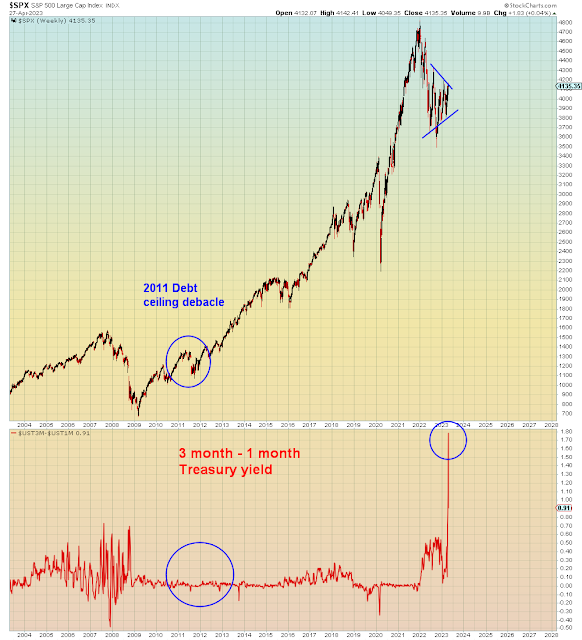In 2023, bulls are trapped between the Scylla and Charybdis of Monetary and Fiscal dumb and dumber. It's a good thing they have artificial intelligence on their side...
The so-called "x-date" for U.S. default is now somewhere in June or July. No one knows for certain. Suffice to say, it's close enough to start garnering the attention of *some* markets. As of last week, the bond market had priced in a six sigma premium on the 3 month t-bill. However, that premium dropped when the House passed their smoke and mirrors spending bill:
WSJ: Democrats Reject House Spending Bill
As we see below, the bond market is far more worried than it was in 2011.
The problem is that this debt ceiling fight has now become all about the 2024 election. Biden this past week said he is running for re-election. Therefore House Republicans see this as their best chance to implode his presidency. Neither side is willing to compromise because both sides are convinced they MUST "win" this battle or admit failure to their own base of morons. This is all politics now.
Here we see the gap between the Treasury VIX (Move index) and the S&P 500 VIX is the largest since 2008:
Also this week, bank explosion re-started after a six week hiatus. The issue for banks is that the pandemic flooded them with unprecedented deposits and they invested those deposits into long-term bonds, creating history's largest duration mismatch. Next, the Fed panic raised interest rates at the fastest pace in history, causing unprecedented bond losses.
Now, deposits are leaving banks for higher yields, because money market funds are yielding 10x higher than typical deposit accounts.
It's looking more and more likely that First Republic will be the next shoe to drop and very likely the first bank NOT to receive a FULL bailout. Meaning that the standard FDIC depositor limit of $250k per account would apply.
Should that happen, we would very likely see mass panic across the ~$7 trillion of uninsured deposits still sitting in banks.
That's when that middle pane black line would meet the blue dotted line and keep on truckin'.
You DON'T have to be a genius to figure this all out. But you DO have to be able to fog a mirror.
All of which gets us back to the much-loved 1930s monetary "pause" rally.
Since bank stocks imploded in early March, Tech domination has reached three decade breadth extremes.
"The S&P 500 at a forward price-to-earnings ratio of 19x would be a high hurdle even at lower rates let alone one where the growth outlook is diminishing, monetary policy is tight with risk-free yielding about 5 per cent, and event risks are increasingly disconnected from VIX"
Overvaluation, profit recession, monetary tightening, unprecedented event risk.
Sound familiar? It's the bull case in a nutshell.
Tech over-weight has been further stretched this week by Tech earnings which have come in "better than feared". Which is the new Wall Street mantra for sucking dumb money into the casino.
Because, let's face it, that's where it belongs.













































